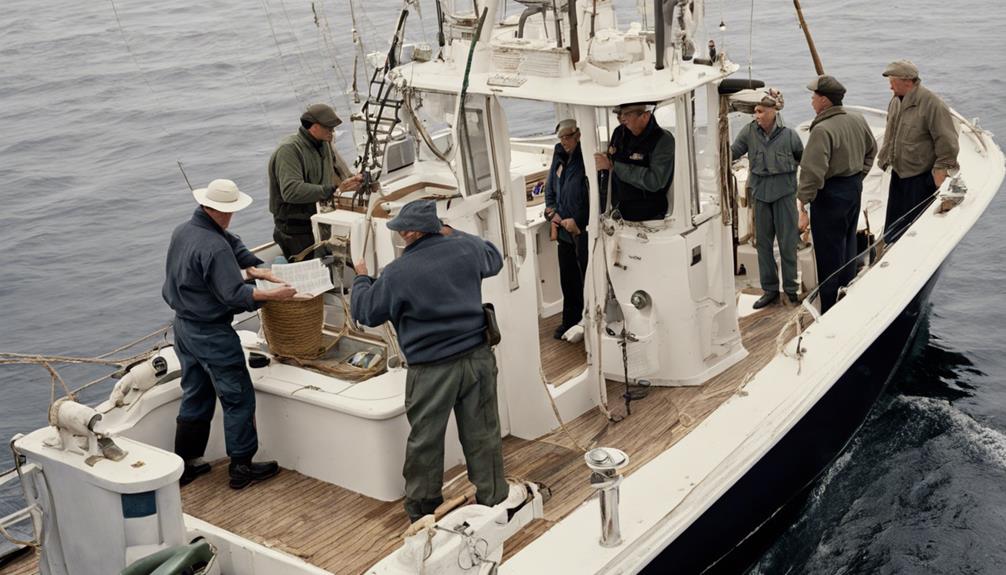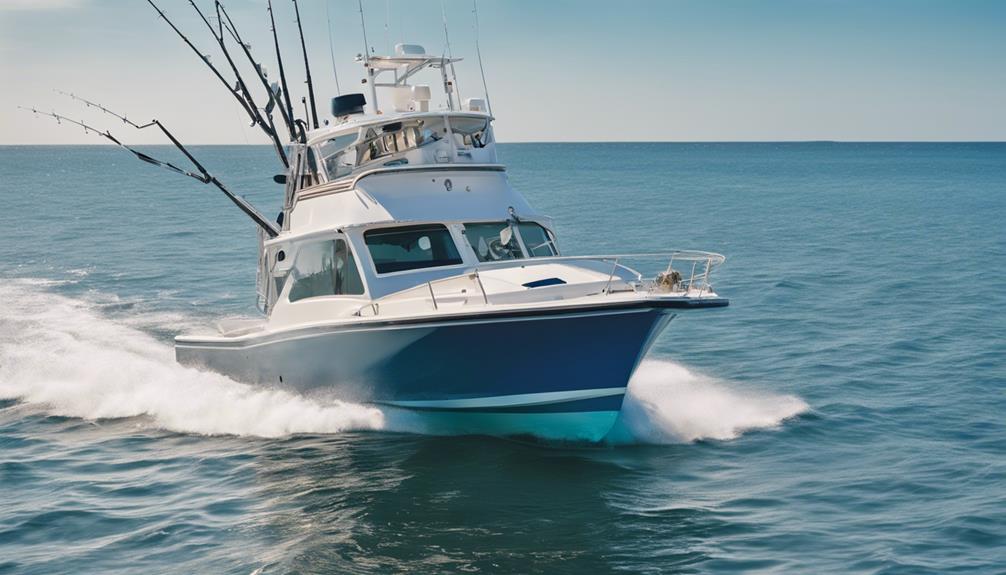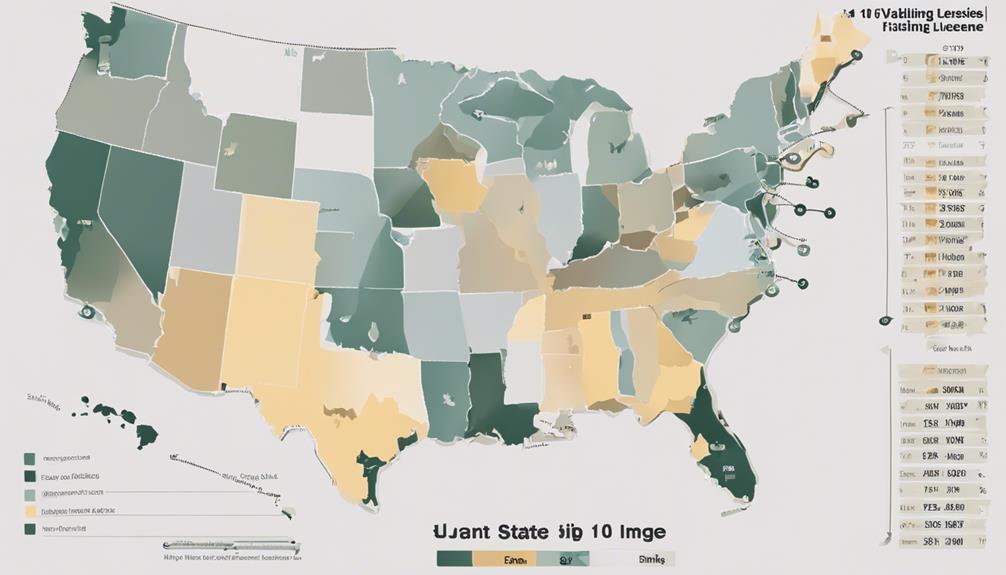When it comes to charter boats, understanding the fishing license requirements is crucial. As a potential angler looking to set sail on a charter excursion, you may be wondering about the specific regulations in place for obtaining the necessary licenses.
Before you cast your line into the vast waters, it is essential to grasp the intricacies of the fishing license mandates for charter boats. So, what are the key factors influencing the licensing process for these seafaring adventures?
Types of Fishing Licenses for Charters
To operate a charter boat legally, you must obtain the appropriate fishing license. However, there are certain situations where license exemptions may apply. License exemptions are typically granted to individuals under a certain age, often minors, or senior citizens above a specific age threshold. These exemptions vary by state, so it's crucial to check with the relevant authorities to ensure you meet the criteria.
Moreover, if you already hold a fishing license from a different state, you may benefit from license reciprocity. License reciprocity allows individuals to fish in a state without obtaining a separate license if their home state has a reciprocity agreement in place. This can be advantageous for charter boat operators who frequently travel between states for fishing expeditions.
Understanding license exemptions and reciprocity is essential for charter boat operators to navigate the legal requirements smoothly. By staying informed about these regulations, you can ensure compliance with the law while enjoying your fishing activities. Remember to keep abreast of any changes in regulations to avoid any potential legal issues that may arise. Whether you qualify for an exemption or can benefit from reciprocity, it's important to follow the guidelines to operate your charter boat within the confines of the law.
Regulations for Charter Boat Licenses
When operating a charter boat, ensuring compliance with specific regulations for obtaining and maintaining the necessary licenses is crucial. Here are some key points to consider regarding regulations for charter boat licenses:
- License Exemptions: Certain exemptions exist for charter boat licenses, depending on the location and type of fishing being conducted. It's essential to familiarize yourself with these exemptions to ensure you're operating within the law.
- Special Permits: In some cases, special permits may be required in addition to the standard charter boat license. These permits could be necessary for specific fishing grounds, protected species, or certain types of fishing equipment.
- Compliance Checks: Authorities often conduct compliance checks on charter boats to ensure they have the appropriate licenses and permits. It's important to have all your documentation in order to avoid any fines or penalties.
- Renewal Procedures: Charter boat licenses usually have expiration dates, and it's vital to renew them on time to avoid any disruptions to your operations. Familiarize yourself with the renewal procedures well in advance to ensure you can continue operating legally.
Validity Periods for Charter Licenses
Understanding the duration of validity for charter licenses is essential for maintaining compliance with regulations. Charter licenses have specific expiration dates, and it's crucial to be aware of these deadlines to avoid any legal issues. To ensure continuous operation, it's important to be proactive in the renewal process. Renewing your charter license on time guarantees that you can continue offering fishing charters without interruptions.
When dealing with out-of-state permits, additional compliance requirements may apply. It's imperative to understand the regulations concerning out-of-state operations to avoid any complications. Make sure to research and comply with the specific rules regarding charter licenses when operating in different states to prevent any violations.
Failure to adhere to the license expiration dates or renewal requirements can result in penalties or the suspension of your charter operations. Therefore, staying informed about the validity periods of your charter license is paramount. Always keep track of important dates and ensure that your paperwork is up to date to operate legally and maintain the credibility of your charter boat business. Remember, compliance is key when it comes to charter licenses, so stay organized and proactive to enjoy hassle-free fishing charters.
Age Requirements for Charter Licenses
Ensure compliance with age requirements for charter licenses to maintain the legality of your operations and prevent any potential issues. When operating a charter boat, it's crucial to adhere to the following age-related guidelines:
- Minimum Age: The minimum age to obtain a charter license varies depending on the location. In most areas, individuals must be at least 18 years old to apply for a charter license. However, some regions may allow individuals as young as 16 to acquire a charter license with certain restrictions.
- Parental Consent: For individuals under the age of 18 who wish to obtain a charter license, parental consent is typically required. This ensures that minors have permission from their guardians to engage in charter boat operations.
- Age Restrictions for Passengers: In addition to the minimum age requirements for obtaining a charter license, there may also be age restrictions for passengers on board. Make sure to check local regulations to ensure compliance with any age limitations for individuals participating in fishing activities on your charter boat.
- Verification of Age: It's essential to have a system in place to verify the age of both clients booking your charter services and guests boarding the boat. This can help prevent any issues related to age requirements during inspections or audits.
Cost of Charter Boat Licenses
To legally operate your charter boat, you must be aware of the costs associated with obtaining a charter boat license. License fees for charter boats can vary depending on the location and the type of fishing activities you plan to offer. Typically, these fees range from $200 to $1,000 per year. Some states may also require additional permits or stamps, so it's essential to research the specific requirements in your area.
License restrictions may apply to charter boat licenses, such as limits on the number of passengers you can have onboard or the areas where you're allowed to fish. These restrictions are put in place to ensure the safety of passengers and the sustainability of marine resources. It's crucial to familiarize yourself with these limitations to avoid any penalties or fines.
Before obtaining your charter boat license, make sure to factor in all the associated costs, including application fees, permits, and any required safety equipment. Additionally, consider attending any necessary training or certification courses to meet all the legal requirements for operating a charter boat. By understanding the license fees and restrictions beforehand, you can ensure a smooth and compliant operation of your charter boat business.
Where to Obtain Charter Licenses
When looking to obtain charter licenses, start by contacting your state's Department of Natural Resources. Here are some key points to consider:
- License Application: To obtain a charter license, you'll need to submit a license application to the relevant state authority. This application may require specific information about the charter boat, its operator, and any additional crew members.
- Charter Boat Regulations: Familiarize yourself with the charter boat regulations in your state. These regulations may include safety requirements, size limits, catch limits, and other rules that govern charter fishing operations.
- Local Marinas and Fishing Associations: Local marinas or fishing associations are often good resources for information on obtaining charter licenses. They may be able to provide guidance on the application process and any specific requirements in your area.
- Online Resources: Many states now offer online resources for charter license applications. Check the Department of Natural Resources website for your state to see if there are online application options available. This can streamline the process and make it easier to apply for a charter license.
Penalties for Fishing Without a License

Fishing without a valid license may result in fines or other penalties, depending on the regulations in your state. It's essential to adhere to the licensing requirements to avoid facing legal repercussions. The fines for fishing without a license can vary significantly, ranging from minor fines to more severe penalties, such as confiscation of equipment or even potential criminal charges.
In many states, fishing fines for not having a license can start at around $50-$100 for a first-time offense. Repeat offenders may face steeper fines, sometimes reaching up to $500 or more. Additionally, some states may impose community service requirements or mandatory court appearances for those caught fishing without a license.
Legal repercussions for fishing without a license can extend beyond just financial penalties. In some cases, individuals may receive citations on their record, which could impact future licensing applications or lead to more severe consequences if the offense is repeated. Therefore, it's crucial to ensure that you have the necessary fishing license before engaging in any fishing activities to avoid these potential legal troubles.
Renewal Process for Charter Licenses
Ensuring timely completion of the renewal process for charter licenses is crucial to maintaining legal compliance and avoiding any disruptions to your fishing operations. Here are some key points to consider:
- License expiration: Charter boat licenses have an expiration date, usually annually. It's your responsibility to keep track of this date to ensure your license is always up to date.
- Renewal reminders: Many licensing authorities send out renewal reminders via email or traditional mail. Make sure to provide updated contact information to receive these reminders promptly.
- Review requirements: Before starting the renewal process, review any updated regulations or requirements that may have changed since your last renewal. This ensures you meet all necessary criteria.
- Submit on time: Late renewals can result in penalties or even the suspension of your charter license. Aim to submit your renewal application well before the expiration date to allow for any unforeseen delays.
Frequently Asked Questions
Can I Use My Personal Fishing License on a Charter Boat?
You can't use your personal fishing license on a charter boat due to non-transferability. Charter regulations typically require each angler to have a separate fishing license. Make sure to check with the charter company beforehand to understand their specific requirements.
It's important to have the correct license to comply with local fishing regulations and to avoid any potential fines or penalties. Be prepared and get the appropriate license before boarding the charter boat.
Are There Any Restrictions on the Number of Fish I Can Catch on a Charter Boat?
When fishing on a charter boat, there are catch limits and regulations set in place to ensure conservation and sustainability of fish populations. These restrictions help maintain healthy ecosystems and prevent overfishing.
It's important to abide by these rules to protect the environment and promote responsible fishing practices. Make sure to check with your charter boat captain for specific guidelines on the number of fish you can catch during your trip.
Are There Any Special Requirements for Fishing in Different Bodies of Water on a Charter Boat?
When fishing on a charter boat, you need to be aware of specific fishing regulations and charter boat permits that may apply to different bodies of water. Different locations may have varying requirements, so it's essential to check the rules for the specific area you plan to fish in.
Make sure you have the necessary permits and are following all fishing regulations to ensure a successful and lawful fishing experience.
Can I Bring My Own Fishing Equipment on a Charter Boat?
You can usually bring your own fishing equipment on a charter boat, but be sure to check the fishing regulations beforehand. Some charters might have restrictions on certain types of gear or baits. Keep in mind that storage space can be limited, so pack only what you really need.
It's a good idea to communicate with the charter company in advance to confirm what personal belongings and equipment you can bring on board.
Do Charter Boat Licenses Cover Multiple Passengers or Just the Captain?
When it comes to charter boat licenses, passenger coverage varies based on license regulations. Some licenses may cover multiple passengers, while others might only apply to the captain.
It's essential to clarify this with the charter company before setting sail to ensure everyone is properly covered.
Understanding the specifics of the license regulations will help you plan accordingly and avoid any potential issues during your fishing trip.
Conclusion
So, now you know the requirements for fishing licenses on charter boats. Make sure to obtain the appropriate license before your next fishing trip to stay compliant with regulations and avoid penalties.
Remember to check the validity period, age requirements, and cost of the license, and be sure to renew it as needed.
Happy fishing!



